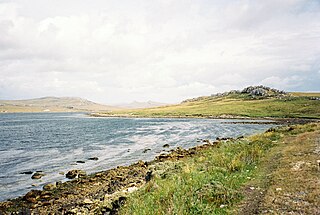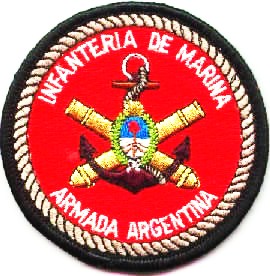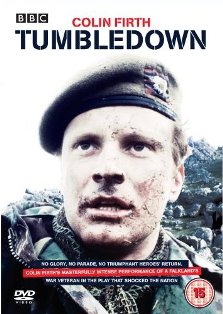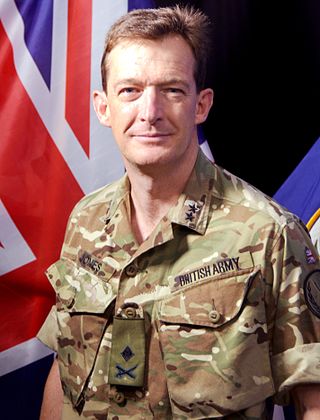Related Research Articles

The Welsh Guards, part of the Guards Division, is one of the Foot Guards regiments of the British Army. It was founded in 1915 as a single-battalion regiment, during the First World War, by Royal Warrant of George V. Shortly after the regiment's formation, it was deployed to France where it took part in the fighting on the Western Front until the end of the war in November 1918. During the inter-war years, the regiment undertook garrison duties in the United Kingdom, except between 1929 and 1930 when it deployed to Egypt, and late 1939 when it deployed to Gibraltar.

The Battle of Goose Green was fought from 28 to 29 May 1982 by British and Argentine forces during the Falklands War. Located on East Falkland's central isthmus, the settlement of Goose Green was the site of an airfield. Argentine forces were located in a well-defended position within striking distance of San Carlos Water where the British task force had positioned themselves after their amphibious landing.

The Battle of Mount Harriet was an engagement of the Falklands War, which took place on the night of 11/12 June 1982 between British and Argentine forces. It was one of three battles in a Brigade-size operation all on the same night, the other two being the Battle of Mount Longdon and the Battle of Two Sisters.
The Battle of Two Sisters was an engagement of the Falklands War during the British advance towards the capital, Port Stanley. It took place from 11 to 12 June 1982 and was one of three battles in a Brigade-size operation all on the same night, the other two being the Battle of Mount Longdon and the Battle of Mount Harriet. It was fought mainly between an assaulting British force consisting of Royal Marines of 45 Commando and an Argentine Company drawn from 4th Infantry Regiment.
The Battle of Wireless Ridge was an engagement of the Falklands War which took place on the night from 13 to 14 June 1982, between British and Argentine forces during the advance towards the Argentine-occupied capital of the Falkland Islands, Port Stanley.

The Battle of Mount Tumbledown was an engagement during the Falklands War. The engagement was an attack by the British Army and the Royal Marines on the heights overlooking Stanley, the Falkland Islands capital. Mount Tumbledown, Mount William and Sapper Hill lie west of the capital. Due to their proximity to the capital, they were of strategic importance during the 1982 War. They were held by the Argentine 5th Naval Infantry Battalion, a reinforced, cold weather trained and equipped Marine battalion.

The 5th Marine Battalion is a battalion of the Argentine Marines.
The Scots Guards are a regiment of the British Army. The regiment cherishes its traditions, especially on the parade ground where the scarlet uniform and bearskin have become synonymous with the regiment and the other Guards regiments. The regiment takes part in numerous events, most notably the Beating Retreat, Changing of the Guard, Queen's Birthday Parade, Remembrance Sunday and State Visits. The Guards' regiments ceremonial uniforms differ from each other only slightly, the differentiations being in the tunic and the type of plume on the bearskin, if any, they have. The Scots Guards uniform consists of tunic buttons in threes, the Order of the Thistle on the shoulder badge, the Thistle on the collar badge and no plume on the bearskin.

Brigadier Charles Calveley Foss, was an English recipient of the Victoria Cross (VC), the highest and most prestigious award for gallantry in the face of the enemy that can be awarded to British and Commonwealth forces. A professional soldier in the British Army, he was awarded the VC in 1915 for his actions during the Battle of Neuve Chapelle.

Tumbledown is a 1988 BBC Television drama film set during the Falklands War. Directed by Richard Eyre, it stars Colin Firth, Paul Rhys, and David Calder.

The Scots Guards (SG) is one of the five Foot Guards regiments of the British Army. Its origins are as the personal bodyguard of King Charles I of England and Scotland. Its lineage can be traced back to 1642 in the Kingdom of Scotland, although it was only placed on the English Establishment in 1686.
The cultural impact of the Falklands War spanned several media in both Britain and Argentina. A number of films and television productions emerged from the conflict. The first Argentine film about the war was Los chicos de la guerra in 1984. The BBC drama Tumbledown (1988) tells the story of a British officer paralysed from a bullet wound. The computer game Harrier Attack (1983) and the naval strategy game Strike Fleet (1987) are two examples of Falklands-related games. A number of fictional works were set during the Falklands War, including in Stephen King's novella The Langoliers (1990), in which the character Nick Hopewell is a Falklands veteran. The war provided a wealth of material for non-fiction writers; in the United Kingdom (UK) an important account became Max Hastings and Simon Jenkins' The Battle for the Falklands.
Major General Sir (Henry) Cecil Lowther, was a British general and Conservative politician, big-game hunter and adventurer.
Lieutenant General Sir John Panton Kiszely, is a retired senior British Army officer who was director general of the Defence Academy of the United Kingdom from 2005 to 2008. He is a former national president of The Royal British Legion.

Major-General Alastair Andrew Bernard Reibey Bruce is a journalist and television correspondent, and a senior British Army reservist and officer of arms in the Royal Household. He commanded the TA Media Operations Group before being appointed Governor of Edinburgh Castle in 2019.
Francis Rolleston Gardner is a British journalist, author and retired British Army Reserve officer. He is currently the BBC's Security Correspondent, and since the 11 September attacks on New York has specialised in covering stories related to the War on Terror.

Mario Benjamin Menéndez was the Argentine governor of the Falklands during the 1982 Argentine occupation of the islands. He also served in the Argentine Army. Menéndez surrendered Argentine forces to Britain during the Falklands War.

Lieutenant Colonel Rupert Stuart Michael Thorneloe, MBE was a British Army officer who was killed in action on 1 July 2009 near Lashkar Gah, Helmand Province in southern Afghanistan. Thorneloe is the highest-ranking British Army officer to have been killed in action since Lieutenant Colonel H. Jones's death in 1982 during the Falklands War.
Major General Michael Ian Eldon Scott, is a retired British Army officer who took part in the Falklands War, and held the office of the Military Secretary of the British Army. In post-military life he was the Bar Council's Complaints Commissioner, and has published several books of history.

Major General Rupert Timothy Herbert Jones, is a retired senior British Army officer, who served as the Standing Joint Force Commander from November 2018 to July 2021.
References
- ↑ Lawrence, John; Lawrence, Robert (1988). When the Fighting Is Over: A Personal Story of the Battle for Tumbledown Mountain and Its Aftermath. London: Bloomsbury. ISBN 0747501742.
- ↑ Rose Hill School Register 1970
- ↑ Townsend, Mark (14 January 2007). "The hardest fight of all for a Falklands hero". The Observer . London. Retrieved 23 September 2009.
- ↑ "No. 47996". The London Gazette (1st supplement). 5 November 1979. pp. 13896–13897.
- ↑ "No. 48710". The London Gazette (1st supplement). 17 August 1981. p. 10652.
- ↑ "Un héroe, todos los héroes" [A hero, all the heroes]. La Nación (in Spanish). 3 April 2011.
- ↑ Hugh Bicheno (2007). Razor's Edge. Phoenix. p. 309.
- ↑ "No. 49134". The London Gazette (1st supplement). 8 October 1982. p. 12847.
- ↑ "No. 49545". The London Gazette (1st supplement). 21 November 1983. p. 15398.
- ↑ "Our Falklands War: A Frontline Story". bbc.co.uk/mediacentre. Retrieved 15 June 2022.